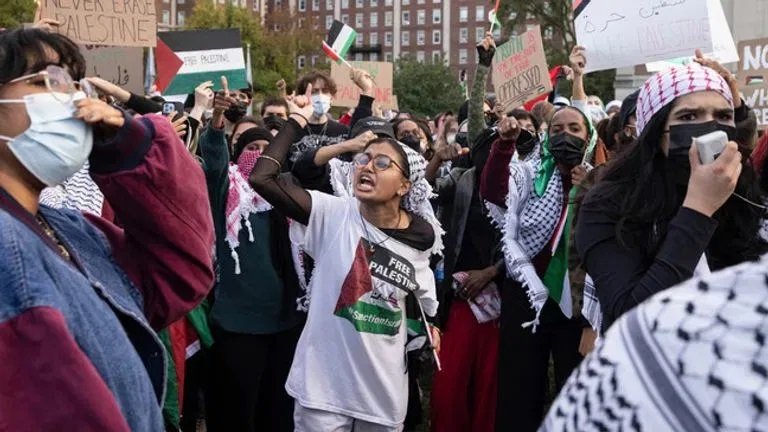As tensions over the Israel-Hamas war spread across American college campuses, some professors have publicly shared controversial, perhaps inflammatory viewpoints.
That’s put free speech rights under the spotlight and put college administrators in the tricky position of protecting academic freedom while fostering safe learning environments.
And some of the professors are now dealing with the consequences of their words.
Emory University said it was “deeply sorry” for the seemingly pro-Hamas views expressed last month by an assistant professor and doctor with Emory’s Winship Cancer Institute in Atlanta.
StopAntisemitism shared a screenshot of a post from Dr. Abeer AbouYabis’ Facebook account that included, “Glory to all resistance fighters,” “No peace on stolen land,” and “We will pay For israel [sic] slaughter.”
Emory told The Atlanta Journal-Constitution last week that AbouYabis is no longer employed or practicing there.
Emory had previously placed AbouYabis on leave and said, “We condemn such comments in the strongest possible terms.”
A professor at the School of Art Institute of Chicago grabbed attention by calling Israelis "pigs,” “savages" and "irredeemable excrement.”
And Cornell history professor Russell Rickford took a leave of absence after the blowback from his comments at an off-campus rally where he described the Hamas terrorist attacks as “exhilarating.”
“This is a reprehensible comment that demonstrates no regard whatsoever for humanity,” Cornell’s president and board chair said in a joint statement.
The Anti-Defamation League has other examples it says of professors expressing pro-Hamas or anti-Israel views.
Meanwhile, the ADL says it has tracked over 50 antisemitic incidents and over 100 anti-Israel rallies on American college campuses to go along with an overall spike in antisemitic incidents across the United States.
“The steady rise in antisemitism in this country over the past several years has now reached fever pitch,” Rep. Jerry Nadler said last week during a House hearing on antisemitism and free speech issues on college campuses. “And few places have had to bear the weight of that trend more than our college and university campuses.”
A Jewish Cornell student who testified at last week’s hearing told lawmakers that the world has “gone mad.”
“I have seen and heard things on and around Cornell’s campus that just over a month ago I could not have imagined,” Amanda Silberstein said.
The Israel-Hamas war is a complicated conflict that has spurred complicated debates over free speech on American college campuses, said Adam Laats, a professor of education and history at Binghamton University in New York.
Pro-Palestine views are nothing new at universities, which Laats said is “part of the sort of U.S. campus leftism” tradition.
Everyone has free speech rights. But American professors have also traditionally been protected by the right to academic freedom.
“It's in the interest of the entire society to have professors free to teach and research the truth,” Laats said.
And that applies even when the “truth” is unpopular.
Academic freedom hasn’t always protected professors. Laats noted how some educators were blacklisted during the McCarthyism era.
But in the ideal, college campuses should be safe spaces for the free exchange of information and ideas.
That, however, doesn’t give a professor the right to use threatening language, Laats said.
“People are dying, and people are frightened, and it makes sense to me as a professor and as someone who cares a lot about academic freedom to notice that ... context matters a lot, and our context right now is very dangerous,” he said.
Praising “resistance fighters” is different from saying that Israeli policies are endangering civilians in Gaza, he said.
“They're two very different claims,” he said.
Academic freedom comes with responsibility, he said. And sometimes it comes with consequences.

